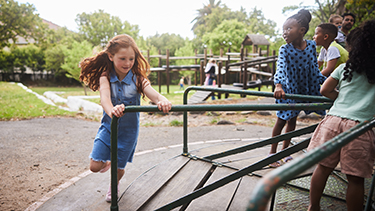Climate change is not just an environmental issue. It's also a pressing threat to our children's health and well-being, especially for Black, Brown and Indigenous children and children living in poverty.
Research finds that climate change impacts, which include extreme weather events, air pollution and wider spread of infectious diseases, are increasingly taking a toll on our youngest generation. Children are suffering from heat-related illnesses, respiratory problems and mental health issues, among other impacts. These findings emphasize the urgent need for interdisciplinary cooperation in confronting the challenge of climate change.
A July 2023 article published in the Maternal and Child Health Journal, “Protecting Children’s Environmental Health in a Changing Climate: A Model Collaboration of the Maternal and Child Health Section and the Environment Section of APHA,” describes how children’s health protection considerations can be advanced through collaborative climate action among public health professionals with different specialties. The cross-section partnership is managed by the Environment Section’s Children’s Environmental Health (CEH) Committee. It represents a potentially replicable archetype for other groups to emulate.
One of the projects described is the CEH Committee’s Climate Change and Youth Education Initiative that developed the original toolkit to aid public health professionals when preparing for lectures to high school students on climate, health and equity. It has since been adopted as APHA’s Climate and Health Youth Education Toolkit. The CEH Committee has also created numerous supplemental resources to support the toolkit and continues to lead efforts to promote these tools to public health professionals to educate youth about the health impacts of climate change, foster their belief in climate solutions and inspire them to take action.
This work will be highlighted in a session at APHA's Annual Meeting and Expo in Atlanta Nov. 12-15. Session 4211, “Climate Action Brings Hope: Youth Engagement in Climate Solutions That Bolster Children’s Physical and Mental Well-Being,” co-organized by APHA’s Center for Climate, Health and Equity and the CEH Committee, will highlight case examples on the use of the toolkit and discuss best practices.
The APHA Environment Section, via the CEH Committee, is organizing another session at the upcoming meeting in Atlanta, this one in collaboration with the Maternal and Child Health Section. Session 3256, "Competencies in Children’s Health: Preparing Public Health Professionals to Protect Children in a Changing Climate," highlights the work of the CEH Committee’s Children’s Environmental Health Curriculum workgroup. The workgroup developed 12 competencies and aligned performance indicators in children’s environmental health for public health students and professionals. This was to increase the number of public health professionals who are able to address both the child health crisis and the climate crisis.
Climate change is a complex problem, and its impact on children's health requires a multifaceted approach. Addressing this issue requires collaboration across various specialties, fields and sectors, focusing on the holistic well-being of our children.
Kristie Trousdale, MPH, is co-chair of APHA’s CEH Committee and deputy director of the Children’s Environmental Health Network.
Photo by Goodbye Picture Company, courtesy iStockphoto